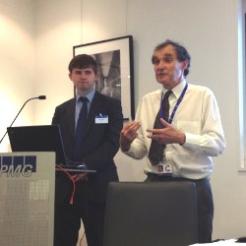Charity Tax Group vice chairman Richard Bray has voiced concerns over the readiness of the sector for HMRC’s new online gift aid system Charities Online, and the possibility that “small charities may not bother”.
At a feedback session with members of the sector this morning, the self-confessed sceptic of Charities Online said that despite his concerns, he believes that HMRC is taking sector feedback very seriously.
But he expressed concerns that current take-up levels indicate that charities may not be ready to submit gift aid claims via Charities Online by the end of September, when HMRC’s transition period for the system ends.
Some 12,000 out of 70–80,000 currently claiming gift aid have registered since the system went live on 22 April, 10,000 of which have activated their accounts after receiving a pin code.
Joined by Roger Blake from HMRC at the session, Bray said CTG may request an extension of the transition period to give charities more time to prepare systems. “This is the biggest practical change for years to gift aid,” Bray said, advising that many charities are having to expend a lot of time, money and having to cooperate with software providers in order to use the new systems.
CTG is undertaking a survey of its members at present to get feedback. After receiving almost 1,000 responses so far, CTG policy adviser Chris Lane shared some of the results with the audience, including the estimated costs to implement software and system changes, which ranged from naught to £150,000. Further, 21.2 per cent of CTG members responding to the survey said they anticipated problems in making the transition before September.
Software development taking time
Bray said that one of the biggest concerns CTG has is the time it is taking for software to be prepared when using the database to database system that it is expected will mostly be used by the largest charities. The feedback received by CTG suggests that many charities are in the process of preparation, but are awaiting time with software companies, he advised.
HMRC’s Blake advised that the department has received submissions via 19 different software products so far, 12 of which have been deemed as acceptable by the HMRC. Of the 19 products developed, 13 have been from external providers and six have come from charities’ in-house departments. Some 163 charities have used database to database so far.
A member of the audience working at the Red Cross advised that the charity had spent a total of 26 days time preparing its systems for Charities Online, having to adapt five or six databases to conform to the systems strict criteria. Staff time, said a member of the audience from Guide Dogs, is the hidden cost of Charities Online. Guide Dogs has received pro bono support for its systems as the external developers are learning from the process of developing the system.
Bray emphasised the importance of not waiting until the last minute to get systems in place. One issue highlighted in feedback is the amount of time taken to receive an activation pin after registering with Charities Online. Charities are sent the pins by post and therefore the HMRC advises this can take up to a week. However anecdotal feedback received by CTG and from charities within the room showed that waiting times can be much longer. One audience member advised they had waited for two and a half weeks, without having received it yet, another said they had been waiting for four weeks. Bray highlighted a potential problem, in that when the pins are issued, they are not sent to a single contact but generically to the charity.
With tight technical specifications Bray advised he still has his concerns about Charities Online, despite working closely with the HMRC, meeting monthly to discuss feedback. In particular, he noted concerns that “small charities may not bother”.










